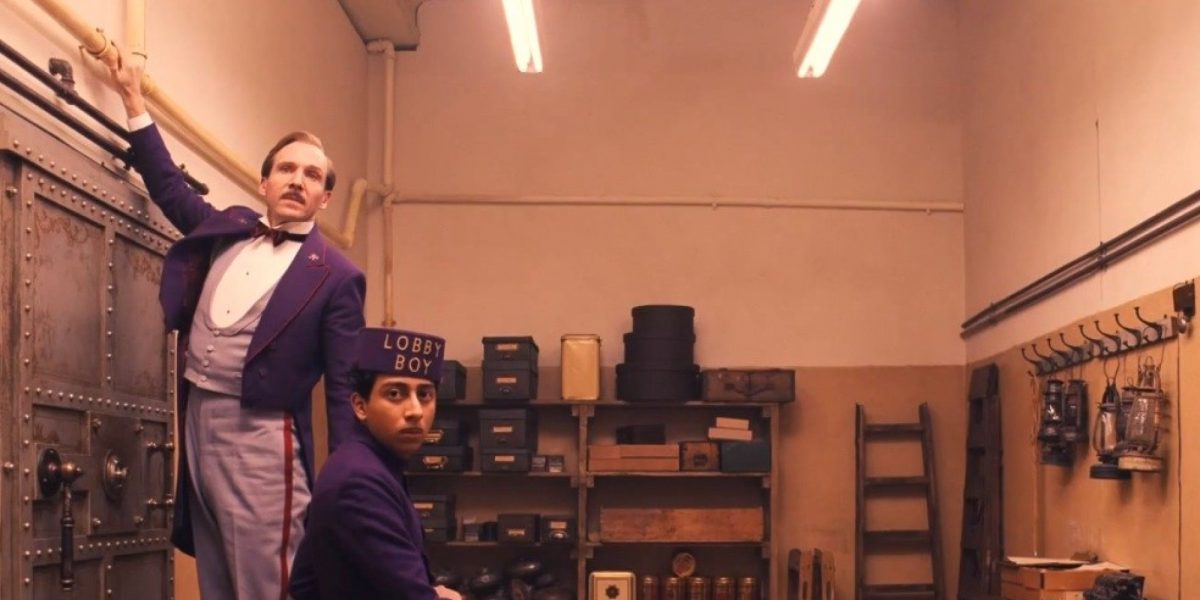
It’s easy to say that Wes Anderson has a soft spot for the outliers, oddballs, and eccentrics of this world. But it’s more than that: He absolutely reveres them. Weird isn’t just a good thing to him, it’s the only thing.
His heroes, which include Rushmore’s teacher’s-pet-from-hell Max Fischer, the Ahab-like titular character of The Life Aquatic With Steve Zissou, and the preternaturally precocious Sam of Moonrise Kingdom have a few things in common: They tend to be obsessive and stubborn and fastidious. Often they, much like Anderson himself, are drawn to the formality, gentility, and artifacts of a bygone age. And they are convinced, unwaveringly, of their own moral and intellectual superiority.
And now we can add Gustave H (Ralph Fiennes) of The Grand Budapest Hotel to that group. He might very well be the most explicitly heroic of the bunch.
He’s the concierge of the hotel, still a place to see and be seen just before the outbreak of World War II, but already a symbol of fading Old World glamour. He’s as conscientious and perfectionist as you would want a concierge to be: Pleasing his customers is his number one priority—even if that means having sex with the aging doyennes who check in. Because he’s such an aesthete, because he squirts himself generously with expensive French cologne, and because he calls everyone “sport” and “darling”, everyone assumes he’s gay, but he’s not. He’s also no coward. His integrity is unassailable—he will fight to the death for his own good name and the good name of his friends. (He’ll also positively kill for a good glass of champagne, darling.)
We meet Gustave through the wide eyes of Zero (Tony Revolori), another one of Andersons’ wonderful filmic sidekicks. (For each eccentric, there is almost always an adoring and trusty sidekick, more resourceful than he looks.) Zero is a lobby boy and Gustave’s stoic and observant pupil, whose painted on pencil mustache suggests that perhaps he shares some of his mentor’s rarefied tastes.
F. Murray Abraham plays the mysterious Mr. Moustafa, who tells the story of Gustave, Zero, and the Grand Budapest Hotel to a keenly interested writer (Jude Law) some 40 years later. The hotel is now in disrepair, sparsely occupied; indeed, it should have been razed along with similar hotels decades ago.
The action, as Moustafa tells it, kicks into high gear when Gustave’s favorite octogenarian benefactor (Tilda Swinton, still unmistakable beneath pounds of makeup) dies and bequeaths Gustave a priceless painting. The family, especially her scoundrel son Dmitri (Adrien Brody), are enraged and have Gustave arrested for her murder. Also on hand: Dmitri’s creepy muscle (Willem Dafoe), an aging tough Gustave meets in prison (Harvey Keitel), and a perpetually one-step-behind police inspector (Edward Norton).
There is also a love story, between Zero and a young pastry maker named Agatha, a pretty girl, save for a birthmark on her face that looks like a map of Italy. The pastries she makes—decadently swirled with whipped cream and nestled fussily in pink boxes—are a character unto themselves.
Wes Anderson’s films are often described as twee or whimsical, but there’s tons of action here—albeit heavily stylized action. There are fights on trains and chases in the alps and even prison escapes, all brought off with Anderson’s characteristic droll wit and imagination. But in the end, The Grand Budapest Hotel is all about the singular creation that is Gustave. Ralph Fiennes has given us a hero for the ages, a sort of Tim Gunn as action hero. It’s a long way from next year’s Oscar time, but here’s hoping he’s not forgotten.
